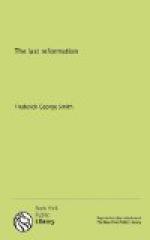It is because of its universal character that truth can accept no such truce as has been declared by the modern sects. Truth is exclusive, and hence can make no compromises. The church of God is universal or it is no church at all. The whole truth concerning the church question must and will come out. The times demand it; the people of God demand it; the Spirit of God demands it; and, as we shall show, the Scriptures declare it.
[Sidenote: A new awakening]
It is very evident that the people of God are not satisfied with the present sectarian situation. Everywhere there is manifested a restlessness and uneasiness respecting the arbitrary lines of sect which separate between those who have a recognized spiritual affinity—recognized except formally by the ecclesiastical powers that be. The Christian consciousness is becoming awakened. Men are coming to see that Christianity is to be measured, not by sect lines, but by that broader, Scriptural rule of the divine family embracing all true disciples of Jesus—those who possess his life and bear the appropriate fruits of righteousness. This awakening, with its logical consequences, is what I have termed THE LAST REFORMATION. It will give form and character to the Church of the Future.
[Sidenote: Apologies for sects]
Sectarianism still has its defenders, however. In the midst of the rising tide of spiritual fellowship and love, there are those who bring forward a few sickly apologies for sects, apologies which generally impress the earnest student of the Scriptures with the thought that the apologist has a hard case to make out. The excuse most commonly advanced is that the sect system is a useful arrangement for accommodating the variety of tastes and feelings found among Christian people. It is assumed that some are natural-born Episcopalians, with an innate fondness for formal liturgies and ecclesiastical vestments, and that others are so constituted by nature as to require certain other particular forms of worship.
[Sidenote: Diversity of taste and culture]
If there is any such fundamental demand in human nature for a variety of sects, as different climates are required to suit different orders of life on our planet, it is strange indeed that the apostles overlooked such an important point and failed to provide for it. Why was not the primitive church constructed so as to bring into existence at once a variety of human sects to accommodate the different classes of people then existing? From the modern point of view they had an excellent excuse for starting with at least two churches—one for the Jews and another for the Gentiles; and if these had not been sufficient, before the end of their personal ministry they could have brought into existence a whole brood of sects.
Now, the student of the Scriptures knows that the apostles proceeded exactly in the opposite direction. They labored earnestly to bring all classes into love and fellowship in one body. This course was not in accordance with the wisdom of the world, but the twentieth century is beginning to see that it was “the wisdom of God.”




